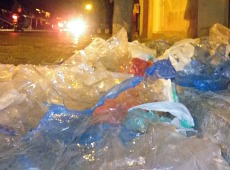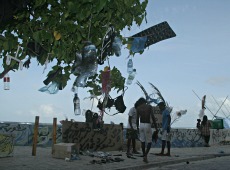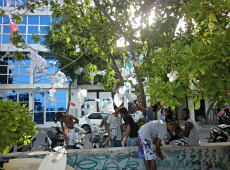The political strife gripping the Maldives has permeated the country’s first pavilion at the Venice Biennale art show, catalysing a behind-the-scenes split that ultimately factionalised the pavilion in what one side contends was a ‘mini-coup d’etat’.
What was initially intended to be an innocent story highlighting the creative climate change advocacy occurring through the pavilion’s artistic expression, instead revealed infighting and controversy stretching back to February 2012.
The official Maldives Pavilion exhibition is curated by a joint Arab-European collective of artists called the Chamber of Public Secrets (CPS), and commissioned by current Minister of Tourism, Arts and Culture Ahmed Adheeb.
The overarching theme of the Maldives’ pavilion, entitled “Portable Nation: Disappearance as a Work in Progress – Approaches to Ecological Romanticism”, is about how the survival of the nation, Maldivian people and cultural heritage are threatened by catastrophic climate change impacts, such as rising sea levels.
The unofficial pavilion, located 200 metres up the road, is the Maldives Exodus Caravan Show, curated by Danish artist and former resident of the Maldives Søren Dahlgaard and initially commissioned by former Minister of Tourism, Arts and Culture, Maryiam Zulfa.
Deputy Curator of the Exodus Caravan Show, Elena Gilbert, told Minivan News that the some of the artists “recognising the necessity and urgency to focus on the current political and cultural unrest of the Maldives, and to provide solidarity with the majority of the population against the dictatorship”, split from the pavilion following February 7’s controversial transfer of power.
The rebel pavilion, Gilbert said, “presents a selection of works and
performances from Maldivian and international artists in regards to an expanded conversation of climate.”
Dahlgaard told Minivan News he “initiated the original idea to have a Maldives National Pavilion at the Venice Biennale in 2010, then presented this idea to former President Mohamed Nasheed and former Minister Zulfa,” Dahlgaard told Minivan News this week.
“In December 2011, Zulfa commissioned me to organise/curate this project – there was no money from the Maldivian government involved in this, I was to raise the finances for the project myself,” said Dahlgaard.
“But now the Maldives National Pavilion is a deeply problematic project, which represents the current coup regime. The artists are now puppets of the regime, whether they are aware of it or not,” he added.
Dahlgaard met with former President Mohamed Nasheed in Copenhagen, Denmark this April and discussed the Venice Biennale ‘proxy-coup’.
“Nasheed laughed when I told him about the coup of the Maldives National Pavilion by Khaled Ramadan, the CPS Danish-based Lebanese curator,” recounted Dahlgaard, “because this is of course peanuts in comparison to the fight Nasheed has gone through and is going through for democracy in Maldives.”
‘Hijacked’ pavilion
Dahlgaard explained that he wanted the project to be a collaborative effort and met with many people experienced with Biennales and large exhibitions, and said ultimately Khaled Ramadan and the CPS decided to join the project.
However, the partnership between Dahlgaard and Khaled began to fall apart following the controversial transfer of power which rocked the Maldives in February 2012.
“Khaled has hijacked the project and is now working closely with the coup regime and representing them in Venice,” said Dahlgaard. “Most of the artists in the Pavilion have not been told this story.”
“After the coup in Feb 2012, we decided to continue the planning of the project, since we were hoping the democratic party would be back in power by June 2013, in time for the opening of the Venice Biennale,” he said.
“If this was not the case, the plan was to clearly state that the Maldives National pavilion was representing the democratic Maldives and did not acknowledge the current coup regime,” he continued.
“You have to be aware of the situation you are part of, and this includes the political situation. The political context is very important… even a flower painting is political in the current context of the situation in Maldives,” he explained.
“So you can not ignore that, especially when dealing with an issue like climate change.”
Dahlgaard alleged that instead of leaving the project, “Ramadan wanted to take control… But the only way he would do this was to jump into the pocket of the current regime in Maldives.”
“Khaled first went to the Venice Biennale office and told them that the commission I had was from the previous government, creating an issue around this so the Biennale Foundation would want a new letter,” said Dahlgaard.
“Then he proceeded to the Maldives, where he stayed for more than two months trying to get an appointment with people at the Ministry of [Tourism and] Culture,” he continued.
According to Dahlgaard, he and Ramadan were supposed to travel to the Maldives together in March 2013, but claimed Ramadan stopped communicating with him in late January.
“I don’t know what Ramadan said to Adheeb and the present Culture Ministry, probably along the lines that ‘Soren Dahlgaard is the son-in-law of [former Foreign Affairs Minister Ahmed] Naseem, is connected to President Nasheed, and therefore representing the opposition now’,” alleged Dahlgaard.
“Or that we had been talking about having a pavilion that would have free expression and be a platform for voices from the ground.”
Ultimately the Ministry of Tourism, Arts and Culture issued a new letter of commission on April 8, 2013, declaring that “Dahlgaard is no longer associated with the Maldives Pavilion by any means” and “obliged” CPS and their representative Ramadan to “send regular reports on their activities to the ministry”.
The previous letter, issued by the ,inistry on March 5, 2013, confirmed that Dahlgaard alone was to be the “official organiser and curator” of the Maldives Pavilion.
“It’s a coup dictator regime that can say whatever they want [and] Adheeb is a horrible gangster,” alleged Dahlgaard.
“He only learned about the project when Khaled Ramadan came to Malé to explain to him that this is a big international cultural prestige project.”
Dahlgaard told Minivan News he believes the situation is “not about two guys having a power struggle”.
“I don’t want or need power or to be the boss; I was not kicking him out,” Dahlgaard said.
“I have nothing to hide and the truth must come out. I am not scared of Khaled’s crazy accusations,” he added. “I have no wish to damage anybody’s reputation. I will however defend myself against untruthful attacks from Khaled Ramadan.”
Nasheed knew nothing about the Biennale: Ramadan
CPS curator Khaled Ramadan and the producer of his documentary film, Abed Anouti, claimed former President Mohamed Nasheed “never knew anything about the pavilion not even till this very moment”.
“I met Mr Nasheed as an Arab journalist and I am sure he has no idea at all about the Maldives Pavilion at the Venice Biennale,” Ramadan said in a letter, sent to Minivan News and the Inter Press Service (IPS) following the publication of articles he felt were “full of errors and misinformation”.
Former President Nasheed told Minivan News on June 10 that “Soren has been working on [the pavilion] for a long time and has in many instances come to me and we have had many discussions about it. The last I heard about was when I was last in Denmark and it’s good he has been able to get the show on the road.”
No dispute
“The pavilion has never been part of any political dispute in the Maldives. It was independently curated from A to Z and different art councils from around the world financed the works of the invited artists,” Ramadan told Minivan News via email.
“In relation to the Venice Biennale, governments do not usually outsource such assignments,” he explained.
“Due to the prestigious nature of the biennale, governments commission professional curators by inviting them to help promote local artists and cultures.”
Ramadan claimed that the “entire project, concept, title, construction of website, design of social media, formulation and design of PR material, and all applications are the outcome of the CPS members, NOT Soren Dahlgaard in any respect.”
“He is incapable of contributing to any of the mentioned products,” Ramadan added. “Mr Dahlgaard has never been an inspiration to any of us in the group due to our academic backgrounds and level of art conduct.”
He alleged Dahlgaard “cheated his way into serious art arrangements like the Venice Biennale by obtaining a letter of commissioning via corrupt contacts and not according to qualifications.”
After the Venice Biennale office contacted the CPS about the March 2013 letter from the Maldives’ Ministry of Tourism, Arts and Culture, which stated Dahlgaard was to be the sole organiser and curator of the Maldives Pavilion, “we immediately contacted the [Maldives’] Minister of Culture asking for an explanation,” said Ramadan.
He claims the letter Dahlgaard provided the Venice Biennale was a “corrupt letter” which Minister Adheeb “didn’t know anything about”.
“Therefore the minister ordered the total removal of Dahlgaard from the project… following an internal inquiry,” said Ramadan.
He said that the CPS’ collaboration with Dahlgaard ended when the Minister Adheeb “discovered that Mr Dahlgaard was misusing the Ministry’s name and was planning a secret pavilion”.
Contentious IPS article
The split at the biennale was first noted by an article on the Maldives Pavilion published on the Inter Press Service by journalist Ferry Biedermann.
Biedermann wrote that the pavilion, once the initiative of former president Mohamed Nasheed, “was almost abandoned after he resigned under hotly contested circumstances in February 2012.”
“The new government, with plenty of other issues demanding its attention, lost interest and allowed a joint Arab-European collective of curators, calling themselves Chamber of Public Secrets, to take over the pavilion and mount a show under the banner Portable Nation,” the journalist wrote.
He cited Maren Richter, an Austrian associate curator: “They did not care. They did not mind. They don’t believe in the power of art to affect anything anyway.”
Following the publication of the IPS article, referred to by Minivan News in an earlier story on the pavilion controversy, Ramadan and Anouti wrote a letter to both publications accusing Biedermann of “misuse and misinterpretation of our artistic intentions” to “score a journalistic sensation”.
“Our work in the Maldives Pavilion is an independent and positive project that focuses on climate issues in global context while addressing the Maldives as a case study,” the pair stated.
“The article by Ferry Biedermann published at IPS is full of miss information. Mr Ferry NEVER interviewed anyone from the Maldives Pavilion, his claims stand for his own account. He has no sound recording, email correspondence, footage or even photos from the curators of the pavilion to support his claims,” they alleged.
Minivan News put the allegations to Biedermann, who replied he was “puzzled more than anything else by how brazen Mr Anouti is in his attack from the very first line.”
“Unfortunately for him, he immediately makes the grave mistake of saying something that can be easily disproven; of course I have sound recordings and email exchanges to prove that I talked to Ms Richter and communicated by email with Mr Ramadan.
“They would never deny that. If they, as curators, do not belong to the Maldives pavilion, then who does?” he said.
Image courtesty the Maldives Exodus Caravan Show
Likes (1)Dislikes
(1)Dislikes (0)
(0) 


